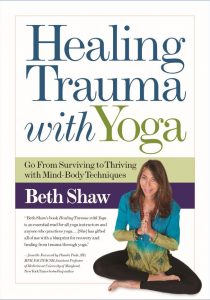Blog
Anti-Inflammation Diet – or What NOT to Eat
Anti-Inflammation Diet—or What NOT To Eat
The following is an excerpt from Healing Trauma with Yoga: Go from Surviving to Thriving with Mind-body Techniques by Beth Shaw.
On top of adding clean foods into your diet, it’s important to eliminate those foods that are bad for you and your internal workings. These include:
- Gluten (it creates brain fog)
- Refined carbohydrates, such as white bread and pastries
- Soda and other sugar-sweetened beverages
- Red meat (burgers, steaks) and processed meat (hot dogs, sausage)
- Margarine, shortening, and lard
- Sugar
- Junk food or fast food
- Excess alcohol or caffeine
- Fried or breaded foods
- Dairy
 Here are some additional tips from Clean Eating author Lisa Davis:
Here are some additional tips from Clean Eating author Lisa Davis:
- Before you go out and buy the foods in [the deli] section, have a plan. For example, “I will get some turkey and make sure I have whatever I need to go along with it to make sure it gets eaten.” If you love whole grain bread and a little mayo, be sure to get that too.
- Be aware of what is perishable and what doesn’t need to be eaten right away. For example, “I will get some almonds that I can easily access, and I will be sure to eat the fresh blueberries today or tomorrow. I will also buy frozen berries that I can use at a later time for smoothies.”
- Look at the foods in [the produce] section and google recipes. For example. “Recipe with asparagus, garlic, and onions.” There are so many great recipes that pop up.
- Keep SAD foods out of the house.
- If you are not up to cooking every day, buy some canned, frozen, or pre-made meals. Just be sure to check the ingredients to see if they are made with real foods.
- Do the best you can. Some days, self-care might be tougher than others, and if you are not up for shopping and only have something to eat that isn’t the best, it’s okay. Do the best you can.
- Look into meal delivery services. There are a lot of good ones out there where either the meal is fully prepped, or they give you the exact amounts of what you need to make the recipe.
- Always remember to eat whole foods as much as possible.
- Also remember to get your complex carbs from veggies, fruits, and whole grains (if you tolerate grains). Be sure to eat healthy protein sources. If you do eat meat, look for grass-fed. Also very important to stay hydrated. Hydration is critical for mental awareness and overall health. The rule of thumb is eight to ten eight-ounce glasses of water per day.
- If you are vegan or vegetarian you will need to be aware of healthy eating as well. For example potato chips and French fries consumed to excess are just not healthy—neither is gluten-rich pasta. Most meat and poultry sources are now factory-farmed and just not clean.
These animals die in a traumatic way, and that energy is passed along when you consume their flesh. Consider eating a more plant-based diet, but put the cookies down.
Knowing what to eat and the why is only part of the puzzle. The rest is figuring out how to make it work for you. Clean eating will go a long way in your healing, I promise you. Try it for a month and see how you feel as the toxins leave your body. Your mind and emotions will thank you, and so will the vessel that is carrying your spirit around—your beautiful and amazing body.
Beth Shaw is the president and founder of YogaFit Training Systems. The leader in mind-body education, YogaFit has trained more than 200,000 fitness instructors on six continents.
Now Shaw is an internationally known fitness expert and the author of Beth Shaw’s YogaFit and the publisher of Angles magazine. Shaw and her company have been showcased in numerous fitness magazines as well as Oprah’s O magazine, Time, More, Entrepreneur, Yoga Journal, Glamour, Self and USA Today. She has also been featured on CNBC, CNN, NBC, CBS, E Style, Channel, Showtime, and Donny Deutsch’s Big Idea.
 To purchase a copy of Healing Trauma with Yoga: Go from Surviving to Thriving with Mind-body Techniques by Beth Shaw, you can go here. You can also buy one wherever fine books are sold.
To purchase a copy of Healing Trauma with Yoga: Go from Surviving to Thriving with Mind-body Techniques by Beth Shaw, you can go here. You can also buy one wherever fine books are sold.
Follow Beth on social media:Twitter Beth Shaw – Twitter YogaFit – Facebook – Instagram
If you are interested in scheduling a book signing or appearance with Beth, please contact Thomas McLean tmclean@cardinalpub.com
To see more of our array of book titles and genres, you can go to our book shop and look around. You just might see something you would like to purchase. If you have any questions, you can contact us at 317-352-8200.
4 Quick Tips to Practice Meditation
The article below is an excerpt from Beth Shaw’s book, Healing Trauma with Yoga: Go from Surviving to Thriving with Mind-body Techniques.  The following 4 quick tips to practice meditation are steps that will help you establish a meditation practice:
The following 4 quick tips to practice meditation are steps that will help you establish a meditation practice:
Just Do It
- Just do it. Commit to practicing your meditation for ten minutes (or more) each day. If that seems too overwhelming to you at the beginning, start with five minutes and tack on one minute every day. Set a timer and try to practice at the same time every day, which could be following your daily yoga practice. Find a comfortable place in your home (even if that means in the corner of your bedroom) and make that space a place of calm and love.
Style
- Choose a style for that day, don’t be afraid to mix it up
Visualize
3. Visualize an object or place in which you find peace, such as a quiet beach or your favorite flower.
Journal
- Journal at the end of your practice so that you can keep track of your progress. For example, write down any techniques you tried and what you experienced practicing them. What were your thoughts and feelings before, during, and after meditating? Also, note if your practice revealed any solutions to questions or situations you’ve struggled to resolve. Finally, keep track of the benefits that you notice from incorporating
 Beth Shaw is the president and founder of YogaFit Training Systems. The leader in mind-body education, YogaFit has trained more than 200,000 fitness instructors on six continents. Shaw and her company have been showcased in numerous fitness magazines as well as Oprah’s O magazine, Time, More, Entrepreneur, Yoga Journal, Glamour, Self and USA Today. She has also been featured on CNBC, CNN, NBC, CBS, E Style Channel, Showtime, and Donny Deutsch’s Big Idea.
Beth Shaw is the president and founder of YogaFit Training Systems. The leader in mind-body education, YogaFit has trained more than 200,000 fitness instructors on six continents. Shaw and her company have been showcased in numerous fitness magazines as well as Oprah’s O magazine, Time, More, Entrepreneur, Yoga Journal, Glamour, Self and USA Today. She has also been featured on CNBC, CNN, NBC, CBS, E Style Channel, Showtime, and Donny Deutsch’s Big Idea.
For more information on meditation, pick up a copy of Beth’s book, Healing Trauma with Yoga: Go from Surviving to Thriving with Mind-body Techniques. You can order a book here or wherever books are sold.
